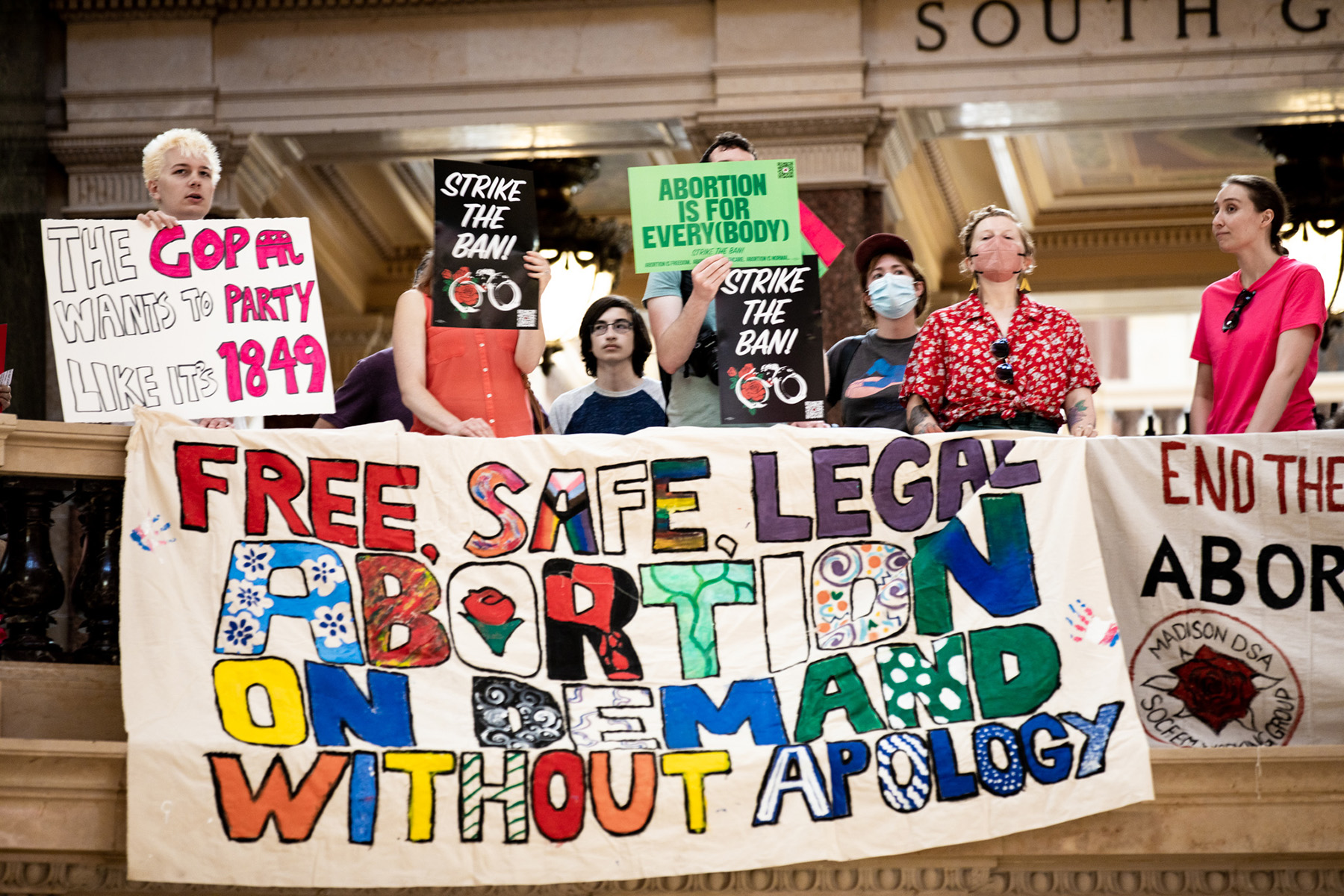A lot can change in 12 months.
One year ago, abortion care was paused in Wisconsin, with a lawsuit challenging an 1849 law believed to ban abortion working its way through the courts. Wisconsin women were forced to leave the state to seek abortion care, traveling to neighboring states where the procedure remained clearly legal.
One of those states was Iowa, where GOP lawmakers were working to curb access to the procedure. In July 2023, Iowa legislators approved a bill banning most abortions after six weeks. After briefly taking effect, a court put that law on hold, maintaining broader access to abortion.The conservative-leaning Iowa Supreme Court lifted that block in June, clearing the way for the law to take effect last week.
Now, most abortions in Iowa are illegal after six weeks — before most women know they’re pregnant.
Meanwhile, abortion care has been restored in Wisconsin since September 2023. Diane Schlipper, a Dane County judge, ruled the 19th-century law does not ban abortion, and the liberal-controlled Wisconsin Supreme Court will hear a case in the fall about whether the state constitution protects access to abortion.
Instead of Wisconsin women traveling to Iowa, Wisconsin abortion providers are expecting Iowa women to travel here.
“We are absolutely anticipating that some folks may travel to Wisconsin to obtain abortion care that they need,” said Analiese Eicher, communications director for Planned Parenthood of Wisconsin.
Planned Parenthood of Wisconsin will coordinate with its colleagues at Planned Parenthood North Central States to support Iowans seeking abortion care, she told Wisconsin Watch. That will build on earlier coordination efforts between the reproductive health care provider’s Midwest branches.
When Wisconsin suspended abortion services, PPWI helped staff a clinic in Illinois for an increase in patient needs, Eicher said. All Wisconsin staff members are back working at their Milwaukee, Madison and Sheboygan locations, but the network and communication between regional Planned Parenthoods are “still going strong,” she said.
The North Central States and Wisconsin affiliates work together by staffing clinics and providing patient navigators to help people receive the care they are seeking, Eicher said.
She noted many Wisconsin residents still go to Illinois, which lacks a 24-hour waiting period, or Minnesota, which is closer to western Wisconsin.
Jenny Higgins, an obstetrics and gynecology professor at the University of Wisconsin-Madison and director of UW CORE, a reproductive health care research initiative, shared that view.
“Wisconsin has a highly restrictive environment, including a mandatory 2-day visit and a ban on telehealth,” she told Wisconsin Watch in an email. “Minnesota and Illinois have neither of those things. So my hypothesis is that few if any Iowans will cross state lines into Wisconsin for abortion care. If they are able to come up with the transportation and resources to leave the state for care, they are much more likely to go to Minnesota or Illinois.”
Iowa’s ban taking effect once again thrust abortion access into the national political spotlight, as Democrats, freed from President Joe Biden’s flailing reelection campaign, look to shift the focus of the campaign onto the repercussions of a second Trump administration.

“I feel sorry for the women in Iowa,” Gov. Tony Evers told reporters last week. “This is a national issue. It’s not just a Wisconsin issue or an Iowa issue. Women should have the right to determine their reproductive health. … But it gets at the whole issue of a national ban that, frankly, the folks on the Republican side have been talking about for a long time.”
“After living under a near-complete abortion ban, Wisconsin today is now an access state, where we can support neighbors in surrounding states who can’t get the reproductive healthcare they need at home,” he added in a statement to Wisconsin Watch. “And we want to make sure it stays that way, which is why we’re again in court fighting to ensure Wisconsin never goes back to operating under a ban like the one Wisconsinites were forced to live under for over a year.”
Democratic leaders from other states have also sought to tie the Iowa ban to former President Donald Trump, who appointed three of the conservative U.S. Supreme Court justices who voted in June 2022 to scrap Roe vs. Wade, ending the federal constitutional right to terminate a pregnancy. They said Vice President Kamala Harris’ outspoken support of abortion access is helping fuel the early energy around her campaign.
“There’s a lot of excitement when it comes to the Harris campaign and knowing that there will be somebody at the top of the ballot in the White House who will protect reproductive health care all across our country,” said Oklahoma state Rep. Cyndi Munson, the House Democratic minority leader.
Jessica Mackler, president of EMILY’S List, a political action committee that backs Democratic women who support abortion rights, said Iowa’s ban taking effect “has a major impact on battleground states” like Wisconsin.
“In the wake of Roe versus Wade (being overturned), Republicans have stopped at nothing to impose these really draconian abortion bans,” she said in response to a question from Wisconsin Watch, adding that “what has happened in Iowa is going to have life or death consequences.”
Speaking at a rally the day before the ban took place, Trump falsely made a claim about sentiment surrounding abortion laws: “Everybody wanted it back in the states — Democrats, Republicans, liberals, conservatives and legal scholars, every legal scholar wanted it back in the states.”
He also praised the conservative justices who overturned Roe vs. Wade, thanking them “for the wisdom and courage they showed on this long-term, very contentious issue,” Rolling Stone reported.
“President Trump has long been consistent in supporting the rights of states to make decisions on abortion,” Trump campaign spokesperson Karoline Leavitt said in a statement to Wisconsin Watch. The campaign didn’t respond to questions about whether the Iowa ban could hurt Trump’s chances in November.
This article first appeared on Wisconsin Watch and is republished here under a Creative Commons license.




